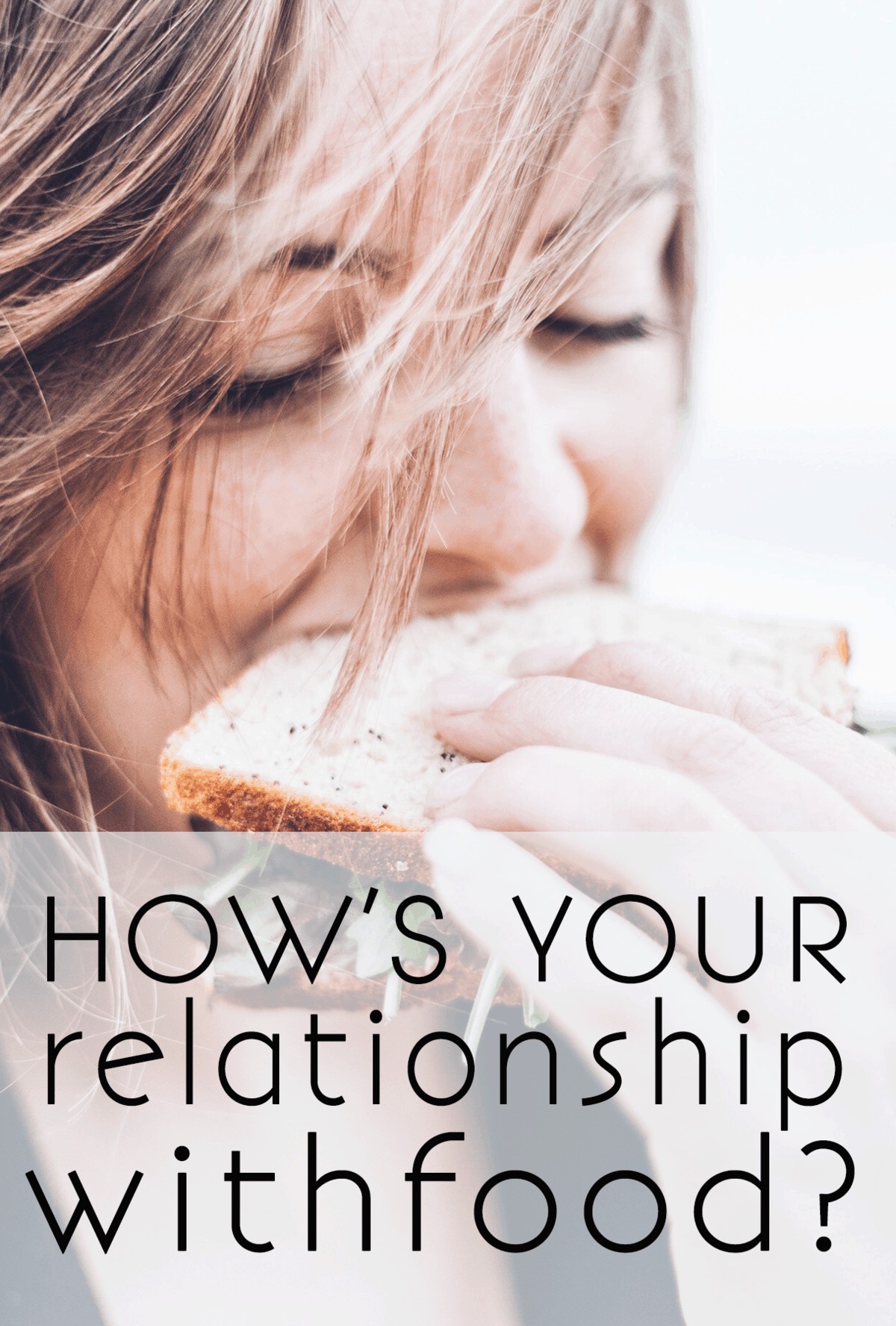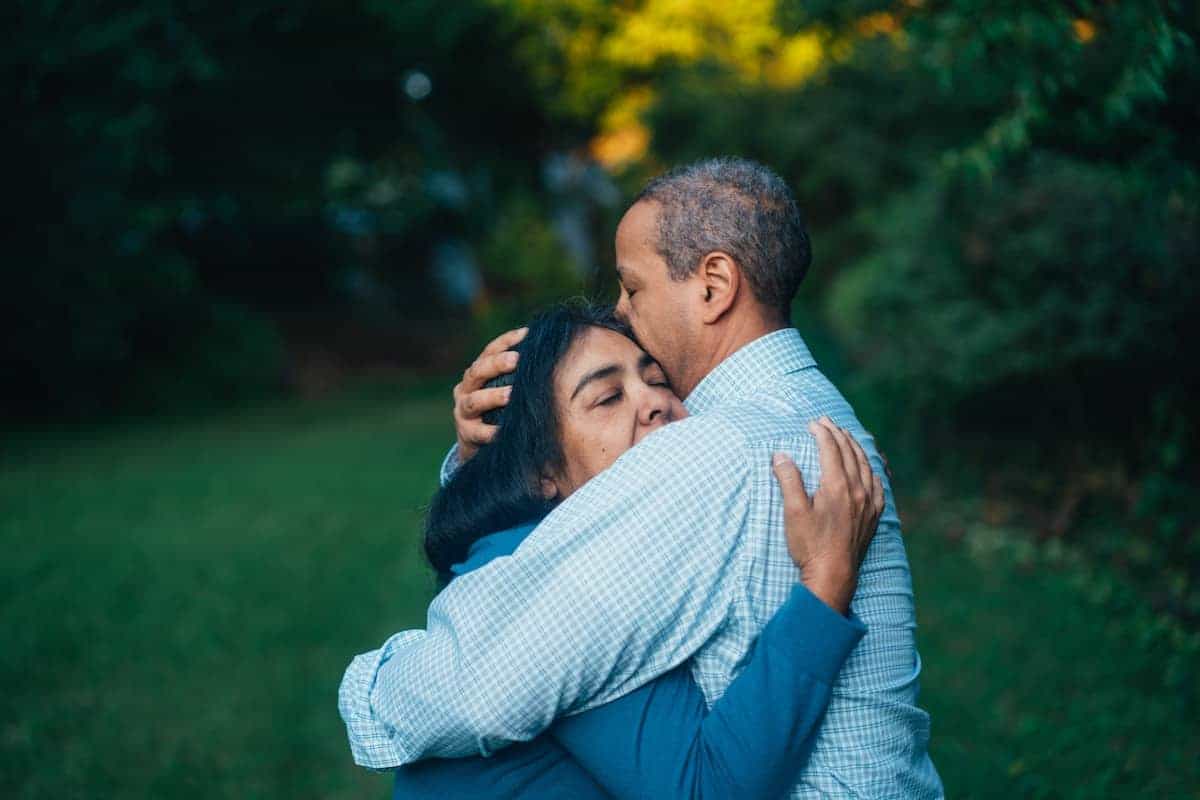
How’s your relationship with food?
You probably have enough relationships to worry about. Your boss, your kids, your parents, your partner… these things are complicated. The last thing you need is to worry about another complex relationship.
Well, as a Dietitian, I have to tell you: your relationship with food is crucial! A quality relationship with food will increase your life span, increase your quality of life, improve your overall health, and most importantly, improve your enjoyment of food.
We spend a lot of time with food. Isn’t that proof enough that the relationship deserves some attention?
So, do you have a good relationship with food, or a bad one? Relationship experts tell us that these are the three biggest main characteristics of a bad relationship.
Characteristics of a bad relationship with food
#1) Inappropriate dependence
What does it say about a 12 year old’s relationship with her parents, if her parents still choose her clothes for her every morning? Or a husband whose wife needs to wake him up in the morning so he won’t be late for work?
These are examples of inappropriate dependence. It’s a natural feature of relationships that we will be dependent on other people for some things, but there’s a line, beyond which most people would agree that dependence is unhealthy for the relationship.
When it comes to food, we are obviously dependent on food… extremely so! We owe it our lives! But again, there is a line of appropriateness. If we are dependent on food in inappropriate ways, it’s a sign of an unhealthy relationship with food, and can have serious side effects.
Many people depend on food for emotional support. For example, when they’re feeling down, or need something to keep them motivated at work, they turn to food. They might also use food as a celebration for more positive emotions.
Regardless, if you are eating as a response to an emotion, it is a sign of a problematic relationship with food. Food is meant to fuel our bodies and provide enjoyment, but not to provide an emotional release. Emotions happen all the time, so eating as a response to them will most likely result in you eating more food than you intend to eat, leaving you unhappy. This can form a vicious cycle where you then respond to that unhappiness by eating more, and so on.
#2) Inappropriate control
Usually in relationships we think of control as a negative thing. A husband shouldn’t control a wife, or vice versa. But control is often appropriate. For example, parents should exert a certain amount of control over their children. A pet owner should have control over their pet (unless it’s a cat, let’s be realistic). If a horse owner doesn’t have control over the horse, that could have disastrous results, for both the owner and the horse!
In your relationship with food, it’s very important that you are in control, and not the other way around. If you find that you’re afraid of being in the same room as certain kinds of food, because you will lose control and eat way too much, then guess what? The food is controlling you.
If you find you need to create rules around food, like “I’ll only eat between these hours” or “I just can’t ever eat this type of food because I lose control” then that’s a sign of inappropriate control. You need to regain control in your relationship with food. Once you do, the rules will not be necessary.
#3) Intimidation & Fear
While control has its place in certain relationships, there’s really no place for intimidation in any healthy relationship. Intimidation induces fear. If one party is being intimidating and the other is full of fear, there’s some clear dysfunction happening in the relationship.
Likewise it’s not a good sign if you feel intimidated or fearful around any aspect of food. Some people intimidate other people into eating a certain way. They might mean well, but the effects of intimidation and fear are generally going to be disordered eating.
It’s also common for people to get intimidated and fearful because of something they’ve heard about specific foods. For instance, people often ask me about the horrors of soy, because they’ve read a fearmongering article about it. They’ve become fearful of that food.
Nutrition experts like Dietitians will rarely (if ever) make you feel fearful about food. We recognize when one negative implication of a food is offset by many more positive implications. We also recognize the negative role that fear and intimidation play in the big picture of healthy eating.
On the other hand, health gurus who don’t have the necessary education to understand the big picture often pick up on a negative finding about a food, and then harp on it to create fear. Even labelling their products as “clean” can have the fearful effect that what you have is “dirty”. This is convenient for them because it turns out that fear of food helps health gurus sell supplement products that most people probably don’t need.
Examine your relationship with food for any signs of fear or intimidation. These are signs that you could work on a healthier relationship with food.
Characteristics of a good relationship with food
So how can you work on a healthier relationship with food? Focus on the following characteristics of a good relationship with food. If you don’t feel like you’re there yet, and you’re not sure how to get there, take the old saying and “fake it till you make it.” Building them into your daily routine in some form will guarantee some level of improvement in your relationship.
#1) Trust
Any healthy relationship is a trusting relationship. Spouses need to trust each other to be faithful, children need to trust their parents to look out for their best interests, etc. Relationships go through rough patches where trust gets broken, but it can be rebuilt again! It just takes some time and work.
So, do you trust yourself to choose foods that will nourish your body? Sure, you haven’t always done that, but you haven’t ever thought about trust in this relationship either, have you? Once you start trusting yourself, you may be surprised by how trustworthy you become.
It’s not like you have to give up sugar or carbs, or any other food here either, it’s just a matter of general good choices. Trust yourself to give your body food that will sustain it, most of the time. Eating an occasional dessert isn’t cheating on that trust, it isn’t a reward for good behaviour, it’s part of enjoying the freedom that comes with a trusting relationship with food.
Do you trust your body to know when it’s full and when it’s hungry? This is an aspect of our relationship where trust is often broken, maybe because we’ve stopped listening to our bodies, and so we believe that our bodies don’t actually know when it’s full. But the evidence says that every human body knows when it’s full (except for rare cases of Willi-Prader syndrome).
The key to re-establishing your trust in this is to work on the next one, communication.
#2) Communication
You’re born with the ability to communicate with your body. As a baby, you did it instinctively. When your body said it was hungry, you cried until you were fed. You stopped eating when you were full. You ate the right amount for what your body needed.
Of course, a lot of us lose that communication as we grow older. A lot of external factors influence this. For example, we’re taught to finish our plates, even if we’re not hungry. We learn to stop paying attention to that important communication channel.
You can regain that communication though, and it’s not hard to do. Just start practicing it on a daily basis. Check in with your body regularly during a meal, or during a snack, or before the snack when you have a craving for something tasty in your mouth. You might realize you’re not actually hungry, you just need some water, or a piece of gum.
#3) Joy
There’s a common term for a marriage that is not healthy. It’s a “joyless marriage.” Every healthy relationship should bring you joy.
Watch out for joy! If you take joy in your eating, it will result in a much healthier relationship with food, and having a healthy relationship with food with result in you taking more joy in your eating! So it’s an upward cycle that you can hop onto at any point.
Just start taking more joy in your food today!
#4) Forgiveness
Nobody makes perfect choices. Maybe you have at one point made a perfect choice, but you won’t always do that. All relationships need to be characterized by forgiveness, leaving room for the other person to make mistakes without judgment.
When it comes to eating, learn to have an attitude of forgiveness for yourself. Take compassion on yourself when you make a mistake. If you feel yourself getting judgey about your eating habits, take a moment to consciously forgive yourself.
If you think of a relationship that has no forgiveness, you’ll realize that holding judgmental grudges doesn’t generally result in changed behavior. You won’t have much success at changing somebody you love by being a jerk to them. You’ll just hurt the relationship you have with them.
Realize that this is true of your relationship with food. Offer forgiveness to yourself at all times.
Conclusion
A good relationship with food is critical to your health, both physical and mental. Don’t neglect the “invisible” mental side of the relationship. Do your best to include trust, communication, joy, and forgiveness in your relationship with food at all times!
This is a lifelong process. It doesn’t end after reading one article! It doesn’t end after taking a 30 day program. You will need to trust yourself, forgive yourself, communicate with your body, and find joy in your eating, day after day after day.
I’ve setup a program to help you do just that. It’s a 12 week program, with lifelong access! So you can take it as many times as you need to, until you’ve established lifelong habits that will help you eat joyfully and guilt-free for the rest of your life!
For more info, check out my program, I Quit Overeating. I’d love to help you find a healthy relationship with food!
[share title=”Share This Article” facebook=”true” twitter=”true” google_plus=”true” linkedin=”true” pinterest=”true” reddit=”true” email=”true”]
[cp_info_bar display=”inline” id=”cp_id_4508c”][/cp_info_bar]









Leave a Reply